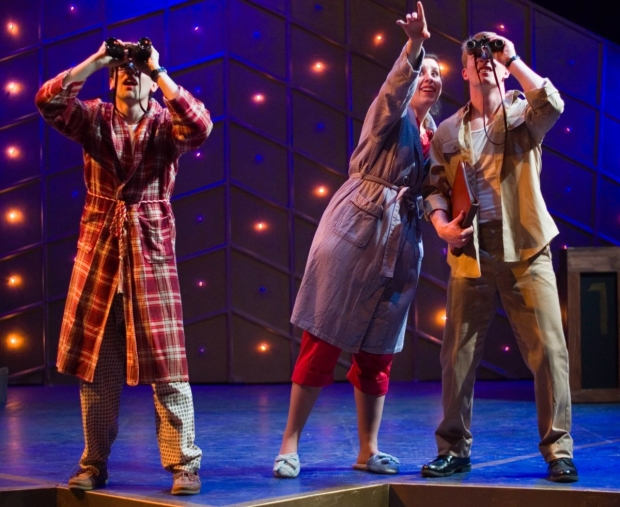Merrily We Roll Along

(© Michael Dekker)
For a musical that ran just 16 performances in its original Broadway run, Stephen Sondheim and George Furth's legendary flop Merrily We Roll Along, famously known for being set in reverse chronological order, sure gets seen a lot. In the last half decade alone, the property, inspired by the Kaufman and Hart play of the same name, received two major revivals, one at New York City Center Encores!, the other at London's Menier Chocolate Factory, where it subsequently transferred to the West End.
Now, the Astoria Performing Arts Center, a company that has made a name for itself in its low-tech rejuvenations of rarely seen musicals, is giving this very New York story their own spin. While this version, directed by APAC's new artistic leader Dev Bondarin, isn't nearly as strong as the group's past work, Merrily as a property is partly to blame.
Despite the artistic challenges inherent to the material, Merrily is one of Sondheim's most flawless scores, containing gems like "Not a Day Goes By," "Old Friends," and "Our Time." And Furth's book is ingeniously constructed in the same style as the source material, telling the story of three longtime friends from the end of their relationship in 1976 to its start in 1959.
The three friends are Franklin Shepard (Jack Mosbacher), a Broadway composer, Charley Kringas (Nicholas Park), his lyricist, and Mary Flynn (Ally Bonino), a fiction-writer-turned-critic. As Merrily begins, Franklin is at the height of his fame but lost in the allure of Hollywood, which turned out to be the opposite of what he actually wanted. His longstanding partnership with Charley has ended after an embarrassing television interview. As for Mary, she's a self-destructive alcoholic. Subsequent scenes follow their lives as they turn from disillusioned adults back into the wide-eyed, big-dreaming youngsters they once were.
In this case, like many other productions, the backwards chronology renders the show's first act largely unplayable. With the exception of three performers — the magnificently neurotic Park as Charley, the lovely Rachel Rhodes-Devey as Frank's first wife, Beth, and the spicy LilyAnn Carlson as Frank's second wife, sexpot Broadway diva Gussie Carnegie — the youngish company struggles to be convincing as the older, dour versions of their characters. Mosbacher, a strong presence with a deep voice, and Bonino, a sweet singer who loses too many of Mary's acerbic punch lines, particularly come into their own in the second half, when they can finally let loose as the characters start aging down.
The quality of the production itself is more distressing than any questionable acting choices. Past APAC revivals, like 2010's The Human Comedy and last year's Allegro, had an air of Broadway-caliber professionalism. Merrily never rises to such heights. The production features outfits (by Jennifer Jacob) that seem more costume-closet-y than realistic, low-level choreography by Misha Shields, and a paltry-sounding five-member band that rarely does justice to the normally lush score. Like the cast members, Bondarin's staging itself feels more at home as the show progresses, though the first half hour is particularly messy.
Still, it's impossible not to be moved by Merrily's second act, when this cast starts firing on all cylinders. The endless possibilities of youth ring true on stage and off, making the fates of these characters even more heartbreaking.











